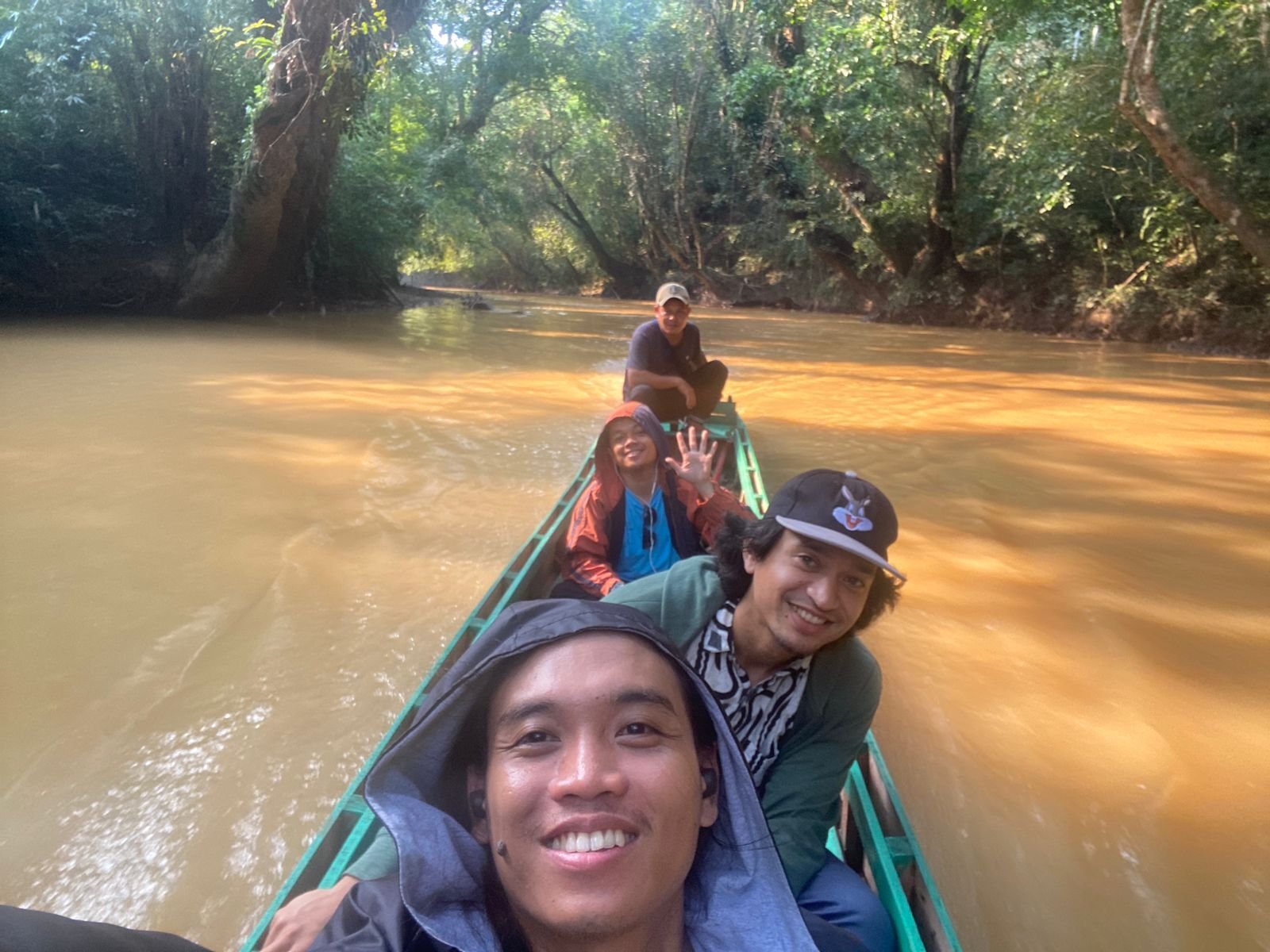Black Bags and Expectations
By Paul Thung
The excitement and challenges of new partnerships
Late at night, we find ourselves on the patio of the village head. Jino, one of Planet Indonesia’s longest-serving team members, arranges coffee cups and cigarette boxes to represent a bridge. The bridge is a metaphor to explain that Planet Indonesia does not bring ready-made solutions but rather helps strengthen local ideas and initiatives (cup 1) by connecting them to technical expertise and government programs (cup 2). The man sitting next to me muses on the idea. Then he says, “Let me show you what usually happens.” He picks up some money and moves it from one cup toward the other, crossing the imaginary river. Halfway across, he suddenly places a black bag over the bills. “What happened?” we ask. He laughs, “We don’t know. It never arrives.”
Jino crossing a bridge.
If you’ve ever been to Indonesia, you might recognize this knack for conveying meaning with unlikely props. To me, the scene reflects the excitement, as well as the challenge of forming a new partnership.
The team traveling by boat through the rivers of Borneo, on their way to build new partnerships in a remote village.
Jino, Mess, Wahyu, and I have traveled a day and a half from our office in Pontianak to one of the remotest parts of Borneo. It is our first time in this village and although we are tired, it is not yet time for bed. We want to make a good first impression and build a connection. At the same time, we’re constantly managing expectations about what we can and cannot do, to avoid disappointments later on. Just as importantly, we also need to understand the lingering traumas, the black bags, that our prospective partners bring to the relationship.
Village in the midday sunshine.
A vision of interconnected, community-managed forests
At Planet Indonesia, we’re excited about expanding our work to the district of Melawi. In the coming years, we hope to partner with four villages in the west of Melawi, on the edge of the Gunung Naning Protection Forest. Since 2020, we have been working in other parts of this ecosystem, which comprises 229,000 ha and straddles four districts. In our long-term vision to establish a collaborative network of community-managed forests in this vast landscape, Melawi is the missing piece of the puzzle.
The region faces significant challenges. In these remote villages, people struggle to make a living from farming or access basic government services and feel left behind by Indonesia’s fast-growing economy. To many, the most promising strategies for catching up seem to be illegal logging or gold mining or partnering with oil palm, mining, or logging companies that promise better roads, employment opportunities, and quick cash. These strategies benefit some people sometimes but often result in disappointment and significant environmental damage. However, we have found that it is exactly in challenging contexts such as this that our model can have the most impact - offering an alternative pathway for people to become active participants in shaping their future and the future of their communities.
“60% clear”
Jino delivering a presentation to village leaders in Melawi, sharing Planet Indonesia's vision of community-led conservation efforts.
Despite our best efforts, we know our vision may not be immediately clear to everyone in Melawi. The next morning, Jino gives a detailed and, in my opinion, brilliantly engaging presentation at the village office. Then we answer all of the questions of the assembled village leaders at length. In closing the meeting, the village head thanks us for the information, noting that it is “60% clear”.
Reflecting on the missing 40%, I realize that it is paradoxically the “community-led” aspect of our approach that may be most difficult to make sense of. People are used to outside experts coming in with ready-made solutions: building infrastructure, providing training, or setting up farmer groups. The questions asked during the meeting reflect this expectation. Will you be providing seeds, and for which crops? Can you build a clean water system? How does the mobile health clinic work? Our answers are rarely straightforward, as we navigate the delicate balance between explaining the value of our approach and avoiding false promises.
Looking ahead
Navigating the river.
On the way home, I feel exhausted and oppressed by the accumulated messages in my inbox. Meanwhile, Jino is in a great mood. The warm welcome in the villages exceeded his expectations. Besides productive discussions in village offices, he treasures the time spent hanging out with different people, discussing a wide range of topics. After these initial encounters, he already feels a strong connection and is eager to return soon. Whether that will happen is not up to us. Now that the village leaders have an idea of what Planet Indonesia does, it is up to them to decide if they want to send us a letter requesting a partnership. If they do – and we think they will – exciting possibilities lie ahead.
For example, we’re eager to pilot a new, more rigorous approach to community-led planning that integrates Legado’s Thriving Futures methodology. This tool is designed to help communities identify and prioritize the key areas they want to focus on in the coming years (think: coffee cup 1). With those priorities in hand, we will together look for the support they might need (cup 2) and ensure it safely crosses the metaphorical river.
If you have any questions please reach out via admin@planetindonesia.org. Sign up for our newsletter and follow us on our social media Facebook here, Instagram here, and LinkedIn here to get timely updates on our activities, an insider’s look into the lives of front-line conservationists, and ongoing programs.





